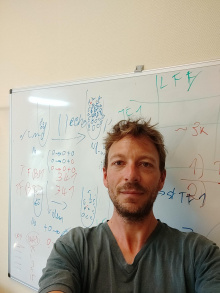Quantifying mutational input in bacterial populations: simulation-based parameter inference & the importance of ecological factors

ANTOINE FRENOY
UMR TIMC “Recherche Translationnelle et Innovation en Médecine et Complexité”, Université Grenoble - Alpes, France
Link to seminar: https://umontpellier-fr.zoom.us/webinar/register/WN_KCrTsiHUSouqAlzopSJsIg
Summary
Mutations are the fuel of evolution, as they are the ultimate source of genetic diversity on which natural selection can act. Mutation rates and environmental factors that modulate them are thus under heavy scrutiny, for example in the study of the evolution of antibiotic resistance, or in the study of cancer.
The pioneering work in the 1940s by S. Luria & M. Delbrück on the independence of mutations and selection provided a method for estimating mutation rate in bacterial populations from a simple overnight experimental assay, the fluctuation test. This test is still widely used today, along with related methods such as the Ames test.
The fluctuation test relies on a restrictive set of ecological assumptions, including the neutrality of the studied mutation and the absence of death (of both wild-type and mutant cells). We use simulation-based inference to circumvent these assumptions, making this assay suitable for a broader range of situations.
We also use simulations and experimental data to highlight two situations where standard methods should not be blindly relied upon to quantify the impact of the environment on the generation of genetic diversity. The first one is the effect of low doses of antibiotic on mutation rate, where increased mutation rate does not generally translate into increased genetic diversity. The second one is the Ames test, where cytotoxicity may hinder the detection of mutagenicity.
Watch previous seminars on our YouTube channel: https://www.youtube.com/channel/UCrX4IsZ8WIFcDa0ZmC7rcQg
Contact: marie.vasse@ird.fr
Contact du Comité SEEM: seem@services.cnrs.fr. Contact du Labex CEMEB: cemeb-gestion@umontpellier.fr


